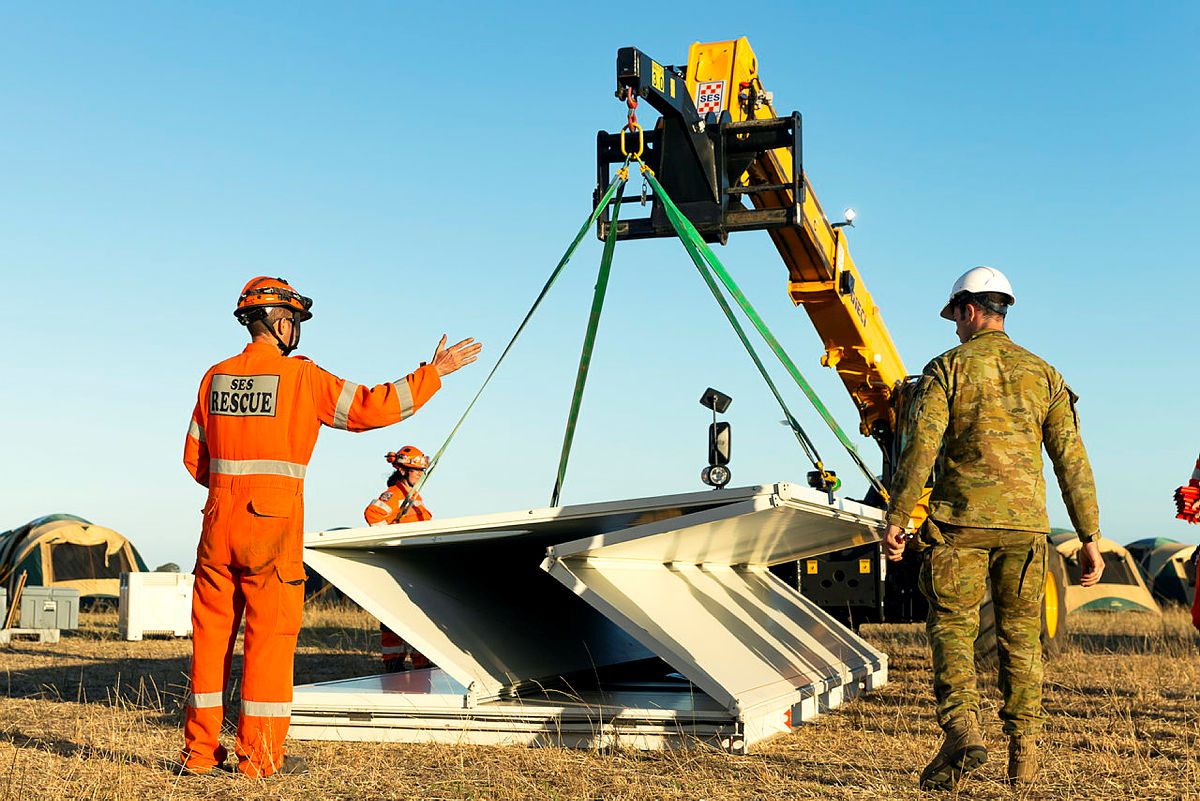
Australia needs an agile surge capacity to provide emergency personnel to respond to disasters, domestically and into our near region. That need will only grow, due to the increasingly frequent and intense weather events we’re now experiencing. The 2019–2020 bushfires and Covid-19 have both illustrated that existing civil security and emergency response arrangements can be quickly overwhelmed.
To date, the Australian Defence Force has been the government’s answer to the increasing demand for civil defence responses. While the ADF is doubtlessly agile and capable, it’s also an expensive capability that is already overcommitted. Australia’s increasingly uncertain security environment is argument enough that the ADF shouldn’t be diverted to civil tasks if they impact on its capacity and capability.
So, where do we get a new civil defence emergency service from?
Volunteers have traditionally been a key element of our state emergency services and country and rural fire services. However, we’re already drawing on a lot of goodwill and community commitment to meet current needs, and we could soon be drawing from an almost empty well.
Australia’s reserve force elements, especially those of the army, have become increasingly capable over the past two decades. But Defence is trying to increase their capacity and capability to perform their primary task of warfighting. The addition of new civil defence training requirements is probably a bridge too far for part-time ADF members already under pressure to meet individual and collective warfighting readiness levels.
In trying to answer this dilemma, I found myself reflecting on my youth in central Queensland. I remember being in awe of the way my family members and the Indigenous stockmen they worked with could fix anything. Of course, living remote requires the development of a high level of resilience. ‘Bush mechanics’ could—and still can—fix almost anything.
In remote communities, many Aboriginal and Torres Strait Islander Australians have those skills. Life in remote places remains challenging, and replacement parts and qualified tradesmen can be days away. The locals are, by necessity, some of Australia’s most resilient and capable citizens.
Little wonder then that members of those communities are sought after for their skills and knowledge of the country by the ADF’s regional force surveillance units in northern Australia: the Pilbara Regiment, the 51st Battalion of the Far North Queensland Regiment and the North-West Mobile Force (Norforce).
Similarly, there ought to be no surprise that northern Australia’s ranger programs rely on Aboriginal and Torres Strait Islander Australians’ capabilities and their deep connection and intimate understanding of Country.
Unemployment is inexcusably high in remote Aboriginal and Torres Strait Islander communities. With the resilience and abilities locals already have, imagine how much more capable these communities would be if training in skills such as search and rescue, first aid, firefighting and swift-water rescue were to be provided.
Being able to call upon a 300- or 400-strong unit of an Aboriginal and Torres Strait Islander civil defence unit, consisting of 18- to 30-year-olds under guidance from local elders to respond to emergencies at home and abroad could be a great force for good.
The skills and training provided to that civil emergency force could be used in Australia’s most remote communities. More importantly, it would bring positive community outcomes, including much-needed employment and training. It will see those ‘bush mechanics’ provided with training that can be used daily in support of their communities.
In northern Australia, susceptibility to natural disasters like cyclones and droughts is exacerbated from a policy perspective by the small size and often wide dispersion of populations. While state emergency services and rural fire services still make significant contributions to those regions, more capability is needed, often on very short notice. An Aboriginal and Torres Strait Islander civil defence force unit has the potential to address that challenge.
And let’s not forget the powerful message that would be sent regionally and nationally when a 300-strong Aboriginal and Torres Strait Islander response force arrives in the Pacific islands to help locals clean up after a cyclone. Or when a unit arrives in southern NSW to help during the next fire season.
Of course, setting up that kind of arrangement would be no easy task. But setting up ranger programs and regional force surveillance units wasn’t easy either. Both programs have had their issues, but both continue to deliver capability.
While the Queensland, Northern Territory and Western Australian governments could establish their own Aboriginal and Torres Strait Islander civil defence units, it makes sense in terms of economies of scale for the federal government to take the lead here.
The program could be integrated with existing policy initiatives, such as the ranger program. The government could make the kind of investment into training and capital to ensure that this force could be kept at a high level of readiness for a fraction of the direct and opportunity costs of having ADF personnel performing the same tasks.

